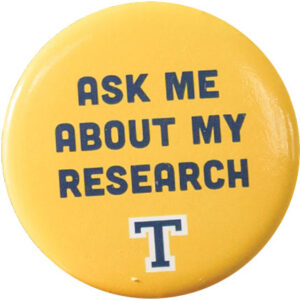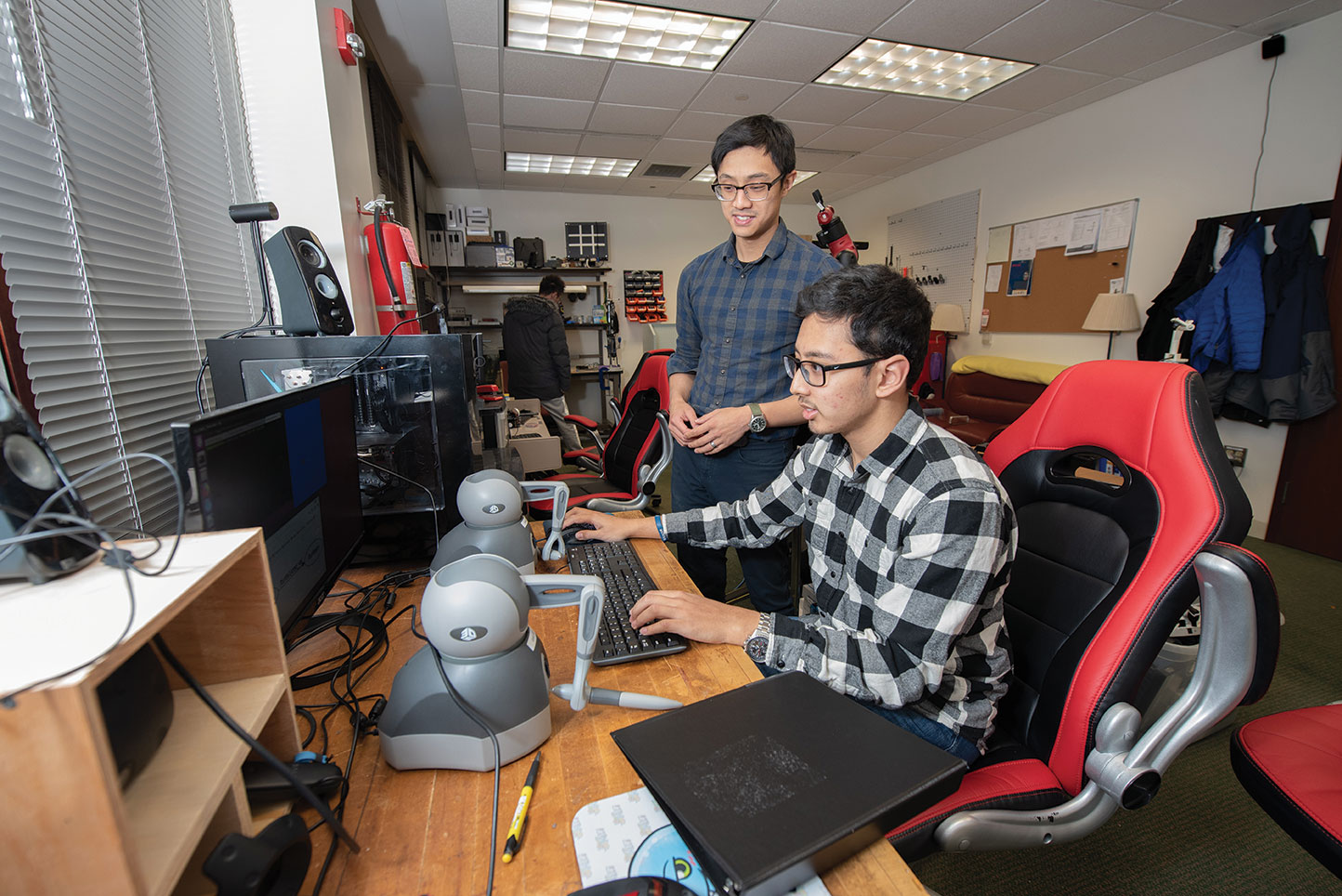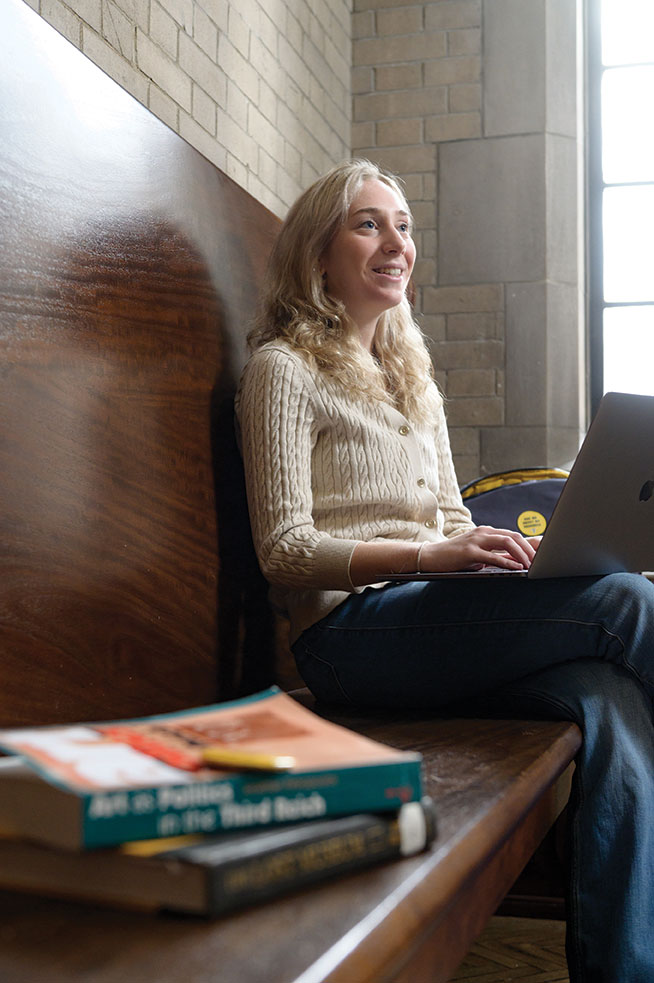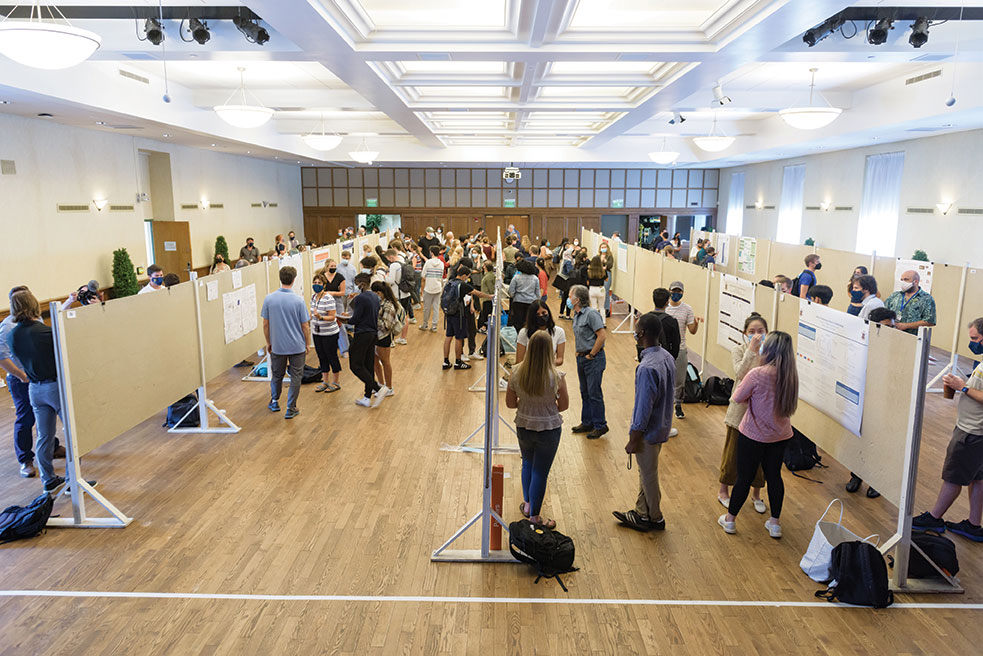Students from across college offer insight into their work
By Andrew J. Concatelli
 When Digesh Chitrakar ’22 came to Trinity wanting to learn more about robotics, he was able to explore hands-on research opportunities in just his second semester. As he began conducting research with Assistant Professor of Engineering Kevin Huang ’12, Chitrakar became one of hundreds of Trinity College students engaged in undergraduate research each year.
When Digesh Chitrakar ’22 came to Trinity wanting to learn more about robotics, he was able to explore hands-on research opportunities in just his second semester. As he began conducting research with Assistant Professor of Engineering Kevin Huang ’12, Chitrakar became one of hundreds of Trinity College students engaged in undergraduate research each year.
“Working with Professor Huang, I was exposed to research in search-and-rescue robotics, medical robotics, and sensor design,” Chitrakar says. “As a result, I was able to see how far-reaching robotics research can be, and this made me want to learn more.”
Students with a wide range of academic interests can have research experiences both on and off campus, whether independent projects designed by the students themselves, close collaborations with Trinity faculty members, or partnerships with community groups and medical centers in the Greater Hartford region. Research is conducted during the academic year, January Term session, or summer through many different programs.
The “Ask Me about My Research” campaign has been encouraging conversations and raising the visibility of student research at Trinity since 2020. When students wear buttons or display stickers reading “Ask Me about My Research,” they really mean it. Brimming with the specialized knowledge gained from these impactful involvements, student researchers are eager to share what they’ve learned and how it will help them in their future academic and professional careers.
ROBOTICS AND SENSOR DESIGN

Photo by Shana Sureck
Chitrakar, an engineering and mathematics double major from Nepal, was matched with Huang through Trinity’s Interdisciplinary Science Program (ISP), which gives students research experiences in their first year on campus. One of the main benefits of undergraduate research, Chitrakar says, is learning how to express ideas clearly. “In research, we put our work forward for others to evaluate, and we need to convince them why the work we presented is necessary,” he says. “We constantly learn new skills, whether they’re technical skills like certain software or soft skills like communication and leadership.”
Chitrakar, who plans to pursue graduate education in robotics, adds that, above all else, research has taught him persistence. “I’ve failed a lot of times; however, it is rewarding to see a project come together in the end,” he says.
The director of Trinity’s Center for Interdisciplinary Science, Alison J. Draper—who runs the ISP and oversees the college’s Summer Research Program in the sciences—says that for a science student, doing research is akin to an athlete playing in a game. “In class, you learn about the concepts in science, but doing research, you’re actually employing those concepts to develop new knowledge,” she says.
CLINICAL SIMULATION
Also part of the ISP, Ja’Quise Green ’24 knew he wanted to pursue a career in medicine and got early exposure to the field through research at the Hartford HealthCare Ayer Neuroscience Institute. Green, a neuroscience major from Chicago, was connected with physician assistant Kent J. Kilbourn.
“I knew that this was an opportunity that many do not get, especially this early in their college journey,” says Green, whose research focused on the role of clinical simulation in improving patient care. “Coming into this, I didn’t understand the importance of learning every patient’s story. With each patient, there is a possibility that something can be discovered.”
Green says that building rapport with mentors is an important benefit for undergraduate researchers. “Research is also a great way of showing the ‘well-roundedness’ of a student like myself, who may have thought that research was seemingly impossible,” he says. “My research experience has allowed me to see the internal side of neurosurgical medicine, which has already begun to benefit my potential career in neurosurgery.”
INVESTIGATIONS IN THE ARTS

Photo by Nick Caito
Research is not limited to the sciences. Kat Namon ’22 began developing her research skills in a first-year seminar and used them to complete senior thesis projects for both her public policy and law and art history majors. “Since I was 13, I have wanted to pursue a career in art law with a specific focus on restitution of Nazi-looted work. I learned about this realm of art law through history classes, movies, and books. I carried this interest with me throughout my academic career, so it felt only natural to pursue the topic in both of my undergraduate theses at Trinity,” says Namon, a Connecticut resident.
Namon worked closely with Associate Professor of Legal and Policy Studies Adrienne Fulco and Professor of Fine Arts Michael FitzGerald. “Trinity has provided me with a supportive environment to practice trial and error when it comes to research,” she says. “I really appreciate the people and resources available, both at the library and in the classroom.”
“I plan to attend law school after Trinity,” Namon adds. “I believe both of my majors and experience conducting research has molded me into the kind of student who can excel in the high-pressure and academically rigorous environment of law school.”
ARCHIVING THE LATINX EXPERIENCE
Gabriel R. Sorondo Guirola ’23 is part of the team working on the Public Humanities Collaborative project, “Voces de la Migración: Archiving and Sharing the U.S. Latinx Experience in Hartford.” As a student researcher since the summer after his first year at Trinity, Sorondo Guirola has explored history recollection strategies, social engagement, and understanding the stories of the Latinx immigrant community in Hartford.
“I am a migrant myself,” says Sorondo Guirola, a Hispanic studies and theater and dance double major from Venezuela. “I am passionate about learning about people’s stories and hopefully, in the end, creating an archive to tell their stories to a wider audience.” The ongoing oral history project is led by Lecturer and Language Coordinator in Language and Culture Studies Aidalí Aponte-Avilés and Associate Vice President for Libraries and Distinctive Collections Christina Bleyer.
“I want to continue in higher education by pursuing a doctorate in Spanish or history and focusing on the impact of oral history and testimonies across literature or time and how they have changed the paradigms of how stories are told,” Sorondo Guirola adds. “My research has allowed me to expand my knowledge, beliefs, and viewpoints in ways I never imagined before.”
WOMEN OF COLOR IN POLITICS
Annika Davies ’21, M’22 and Blythe Young Hastings ’23 worked together to research and write the article “Doing It for Themselves: Women of Color and the 2020 Congressional Elections” for 1619: Journal of African American Studies. The article, on which the students worked with their adviser, Professor of Political Science Stefanie Chambers, provides an overview of the historic levels of representation achieved by women of color in the U.S. Congress in the 2020 election.
“Examining [this success] can help to increase representation in the future,” says Davies, who is from Pennsylvania and earned a B.A. with a double major in political science and economics and an M.A. in public policy. “The research I have done at Trinity has given me the experience to prepare for the intensive research that comes with pursuing a Ph.D. I learned about the process of writing an article from brainstorming to the peer-review stage. This published article is also a meaningful addition to my résumé.”
Hastings, a political science major from California, says that she began this work in conjunction with a J-Term class called “Gender and Politics,” taught by Chambers. “The research opportunities provided by Trinity professors allow students to expand on topics talked about in class,” Hastings says. “I hope that, with help from women like Professor Chambers and from the education I receive from Trinity, along with my research, I can follow in the professional footsteps of women before me.”
Chambers adds that co-authoring with students is just one way for faculty to create meaningful educational opportunities. “It’s exciting to introduce students to the scholarship and peer review process,” she says. “Several of the students who have worked as my research assistants and co-authors have gone on to graduate school, medical school, and law school. Following their career and educational successes is one of the most meaningful aspects of my job.”
Whenever a student in any discipline is asked about their research, the common thread is Trinity’s faculty. Dean of the Faculty and Vice President for Academic Affairs Sonia Cardenas says, “More than peers at other colleges, Trinity students have remarkable opportunities to conduct research alongside faculty mentors, whether in science labs or public humanities projects. These undergraduate research experiences, which are a key part of the new Trinity+ curriculum, empower students to apply what they learn in practice. It’s when students have the opportunity to generate knowledge through research that we see the value of the liberal arts on full display.”
For more about research opportunities available to Trinity students, please visit https://www.trincoll.edu/academics/student-research-opportunities/.
More from student researchers

Photo by Nick Caito
Alexandra Barbosa Gonzalez ’24—Mexico
Majors: Engineering, with a concentration in biomedical engineering, and physics
Research: Investigation of acoustic spectrum in a simplified aortic valve stenosis, with Assistant Professor of Engineering Clayton P. Byers
“I am very passionate about health care and how science and engineering can improve or innovate the current medical devices, methods of diagnosis, and health treatments. I became interested in this research because it is a project with an engineering basis and potential health care applications. When you do research, you learn a new bunch of skill sets that are very valuable for a career in science, such as creativity and how you communicate to others what you are studying.”
Aprille Gangi ’23—Massachusetts
Major: Neuroscience
Research: Resilience in multiple sclerosis patients, with Elizabeth Gromisch, Ph.D. ’09, neuropsychologist at the Joyce D. and Andrew J. Mandell Center for Comprehensive Multiple Sclerosis Care and Neuroscience Research at Mount Sinai Rehabilitation Hospital, and Charles A. Dana Professor of Psychology and Neuroscience Sarah A. Raskin
“Doing research as an undergrad has been a tremendous learning experience. I came to college with a love of science and people, unsure of what I wanted to pursue. Research has opened my eyes to the world of academia and ongoing innovation and discovery. I have been challenged to ask why, [to] work collaboratively and independently, and [to] see how research can directly impact individuals and their quality of life. As a physician, I will greatly benefit from my clinical experience working with chronically ill patients and seeing, firsthand, their day-to-day struggles.”
Hawa Gikineh ’22—New York
Major: International studies: global studies
Research: How hip hop culture is expressed and defined and how it can be incorporated authentically in academia, with Associate Professor of History and International Studies Seth Markle and Khaiim Kelly ’03, aka Self Suffice the RapOet
“I was transcribing interviews with artists, organizers, and participants of the annual Trinity College International Hip Hop Festival run by the student-led organization, Temple of Hip Hop, here at Trinity. I had never had any introduction to metadata writing before this. It was a lot of work, but this is a skill set I have developed because of my research assistantship that I can introduce to any job I go to and be successful there as well. I want to teach in communities that get overlooked and help change the narrative that people have of those communities and the ones that they may have of themselves.”
Sarah Mathew ’23—Connecticut
Major: Neuroscience; minor: biology
Research: The impact of a ketogenic diet on the reinforcing properties of varying doses of cocaine in young-adult Sprague Dawley rats, with Assistant Professor of Neuroscience Luis A. Martinez
“Doing research as an undergraduate allows you to take what you’ve learned in the classroom and translate those lessons into relevant findings. I have also been able to establish strong professional relationships with my lab mates and professors and participate in academic presentations. I hope to pursue a career in medicine, and I feel now as though I am a more well-rounded applicant for my future career-related aspirations.”
Brooke Samaratunga ’22—Minnesota
Majors: Art history and international studies; minor: Chinese language
Research: Hip hop and activism in Tanzania, with Associate Professor of History and International Studies Seth Markle, and Project South, a nonprofit in Atlanta dedicated to racial justice
“As the child of Sri Lankan immigrants, I have always had a fascination with social movements and unifying around a shared goal. Through researching hip hop in Tanzania, I was able to dive into activist movements and witness how art can be used as a tool of change. This research was the perfect marriage between my interest in art history and international studies, as I was able to understand the role of art in activist movements. My favorite part of my research experience is being able to form a meaningful relationship with professors. Learning from an expert in the field and seeing how his research is applicable to present-day society has been an invaluable experience.”
Nic Zacharewski ’23—Michigan
Majors: Neuroscience and German studies
Research: Neurology and neurosurgery at Hartford HealthCare’s Ayer Neuroscience Institute, with Sunil Majila, M.D., Danison Emmerson, M.D., and Kent Kilbourn, PA-C
“I have always been interested in clinical neurology and neurosurgery. What interests me the most [are] the intricacy of the diseases and the volume of things you can learn. I think that my education and research experiences at Trinity will put me ahead of my peers. As I carry on in my career as a neurosurgeon, this foundational experience will make me a competitive and successful researcher and clinician.”
